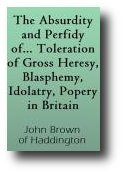 Loading... Please wait...
Loading... Please wait...- SWRB Home
-
Free Resources
- Short Listings Of Free Reformation & Creation Resources
- Free Reformed, Puritan, Covenanter and Creationist Videos
- Thousands of Links to Free Audio, Video and Printed Resources
- Free Puritan Books, Reformed MP3s, and Calvinist Videos
- Puritan Quotes, Free Reformation MP3s, Reformed Books and Calvinist Videos From PuritanDownloads.com On FaceBook
- Shipping & Returns
- Blog
- Privacy Policy
- Contact Us
- Payment Options
- Help
-
About Us
- Sitemap
Pastor Scott Brown, on the left in the video above, is the Director of the National Center for Family-Integrated Churches (NCFIC)
Resource Categories
- PURITAN HARD DRIVE REVIEWS
- PASTOR ROB VENTURA ON THE PURITAN HARD DRIVE
- DR. VODDIE BAUCHAM, JR. ON THE PURITAN HARD DRIVE
- R. C. SPROUL ON SWRB
- DR. JOEL R. BEEKE ON THE PURITAN HARD DRIVE
- PASTOR GREG L. PRICE ON THE PURITAN HARD DRIVE
- DR. MATTHEW MCMAHON ON THE PURITAN HARD DRIVE
- PASTOR SCOTT BROWN ON THE PURITAN HARD DRIVE
- PASTOR W. J. MENCAROW ON THE PURITAN HARD DRIVE
- JOAQUIN FERNANDEZ ON THE PURITAN HARD DRIVE
- PASTOR DAVID SILVERSIDES ON THE PURITAN HARD DRIVE
- JOHN HENDRYX ON THE PURITAN HARD DRIVE
- PASTOR KEVIN GUILLORY ON THE PURITAN HARD DRIVE
- RICHARD BENNETT ON THE PURITAN HARD DRIVE
- DR. KENNY RHODES ON THE PURITAN HARD DRIVE
- JUSTIN RAWSON ON THE PURITAN HARD DRIVE
- PASTOR JAMES WALLACE ON THE PURITAN HARD DRIVE
- PASTOR RICHARD GAGNON ON THE PURITAN HARD DRIVE
- PASTOR JOE HAYNES ON THE PURITAN HARD DRIVE
- DR. STEVEN DILDAY ON THE PURITAN HARD DRIVE
- PASTOR ANDREW COMPTON ON THE PURITAN HARD DRIVE
- TERENCE ELLARD ON THE PURITAN HARD DRIVE
- PASTOR JERRY JOHNSON ON THE PURITAN HARD DRIVE
- PASTOR DAVID PETRIE ON THE PURITAN HARD DRIVE
- JIM DODSON ON THE PURITAN HARD DRIVE
- PASTOR BRIAN SCHWERTLEY ON THE PURITAN HARD DRIVE
- PASTOR PHIL GIBSON ON THE PURITAN HARD DRIVE
- MEL R. EVERINGHAM II ON THE PURITAN HARD DRIVE
- PAUL BLYTH ON THE PURITAN HARD DRIVE
- STEVE KETTLER ON THE PURITAN HARD DRIVE
- D. M. (CALIFORNIA) ON THE PURITAN HARD DRIVE
- MICHAEL CAUGHRAN ON THE PURITAN HARD DRIVE
- WIILIAM NOPPER IV ON THE PURITAN HARD DRIVE
- LINDA THERIAULT ON THE PURITAN HARD DRIVE
- WILLIAM WARNOCK ON THE PURITAN HARD DRIVE
- ROBERT KOH ON THE PURITAN HARD DRIVE
- WHAT'S ON THE PURITAN HARD DRIVE?
- ALL PURITAN HARD DRIVE VIDEOS
- PHD-ODE INSTALLATION VIDEOS
- COMMENTS ON SWRB
- ALL PURITAN QUOTE VIDEOS
- PURITAN HARD DRIVE SCREENSHOTS
- PURITAN HARD DRIVE MINISTRY AND DONATION OFFERS
- TABLE OF RESOURCE CATEGORIES
- Advanced Studies
- SWRB SERMONAUDIO MOBILE APP
- Apologetics
- Assurance
- Attributes and Holiness of God
- Augustine
- Banner of Truth
- Baptism
- Beginners
- Bibles (Geneva, KJV, Hexapla, etc.)
- Biblical Counseling
- BIBLICAL HD COLLECTION
- Biblical Interpretation (Hermeneutics)
- Biographies and Autobiographies
- Calvinism and the Sovereignty of God
- CALVINISM HD COLLECTION
- CALVINIST CLASSICS HD COLLECTION
- Charles Spurgeon
- Children's Books
- CHRISTIAN EDUCATION HD COLLECTION
- Christian History
- Church Government
- Civil Government and Resistance
- CLASSIC CHRISTIAN HD COLLECTION
- Classic Puritan and Reformed Sets
- Commentaries
- Contemporary Issues
- Covenant Theology and Covenanting
- COVENANTER HD COLLECTION
- Covenanters and Covenanted Reformation
- Creation and Creationism
- Creeds, Confessions and Covenants
- Cults, False Religions, Psychology, Humanism
- Dealing with Affliction, Suffering, and Sickness
- Debates
- Dutch Reformed
- Education and Home Schooling
- English Puritans, Covenanters and Reformers
- Family, Children, Home, and Family Worship
- First Reformation
- Five Points of Calvinism (TULIP)
- For Pastors and Elders
- For Seminary Students
- FREE PURITAN & REFORMATION MP3 AUDIO SERMONS/BOOKS
- FREE PURITAN BOOKS, REFORMATION MP3s, PDFs, VIDEOs
- George Gillespie
- God's Law, The Ten Commandments, etc.
- Greg L. Price on Headcoverings
- Heaven, Hell and the Final Judgment
- Holy Days (Lord's Day, Christmas, Easter, etc.)
- HOME SCHOOL HD COLLECTION
- Intermediate Studies
- John Bunyan
- John Calvin
- John Knox
- John Owen
- Jonathan Edwards
- Justification
- Languages, Dictionaries, Reference, etc.
- LOOK WHO LOVES THE PURITAN HARD DRIVE
- Lord's Supper (Communion)
- Marriage, Courtship, etc.
- Martin Luther and Lutheranism
- Martyrs and Persecution
- Other Protestant Works
- Predestination and Providence
- PRESBYTERIAN HD COLLECTION
- Presbyterians and Presbyterianism
- Prophecy, Antichrist, and Eschatology
- PROTESTANT HD COLLECTION
- PSALM SINGING MP3s (COMPLETE SET)
- Psalters, Psalm Singing and Music
- Puritan Facts
- PURITAN FAST SERMONS (1640-1653) - 34 VOLS SET
- Puritan Fast Sermons 1640-1653
- Puritans and Puritanism
- PURITAN HARD DRIVE
- REFORMATION HD COLLECTION
- Reformation History
- Reformed and Puritan Classics
- Reformed Baptist
- REFORMED BAPTIST HD COLLECTION
- REFORMED HD COLLECTION
- REFORMED PRESBYTERIAN HD COLLECTION
- Reformed Presbytery, RPNA Protesters, etc.
- Reformed Theology
- Reformed Worship, The Regulative Principle, etc.
- Roman Catholicism, the Jesuits, Islam, etc.
- Salvation and Evangelism
- Samuel Rutherford
- Sanctification, Prayer and Holiness
- Scottish Covenanters
- Scottish Presbyterianism
- Scripture Song MP3s (Psalms and Bibles Verses)
- Second Reformation
- Separation, Unity, Uniformity, etc.
- Sermons and Sermon Collections
- Solemn League and Covenant
- Theology and Doctrine
- Third Reformation
- Thomas Watson
- Westminster Confession, Assembly and Divines
- Authors (All A to Z)
Phone Orders:
(780) 450-3730
To obtain free Reformation books, Puritan MP3s and Calvinistic videos, SWRB discount coupons, etc., add yourself to SWRB's Puritan and Reformed email list by using the form above.
The Absurdity and Perfidy of All Authoritative Toleration of Gross Heresy, Blasphemy, Idolatry, Popery, in Britain by John Brown of Haddington
Resource Description
The sub-title reads: "In two letters to a friend in which the doctrine of the Westminster Confession of Faith relative to Toleration of a False Religion, and the power of the civil magistrate about sacred matters; and the nature, origin, ends and obligation of the National Covenant and Solemn League are candidly represented and defended." Here Brown deals with three major Reformation attainments (anti-tolerationism, establishmentarianism and the obligations of lawful covenants as they biblically bind posterity) that Satan has always been especially concerned to overthrow -- in every major demonic move to open the floodgates of lawlessness, anarchy and misrule.
Fletcher, in the preface to the 1797 edition, relates this truth as it comes to bear on various religious professors, stating, "Papists were enemies to our covenants because they were a standard lifted up against their system of abominable idolatries. Episcopalians were enemies to them, because they were a standard lifted up against their anti-scriptural church-officers and inventions of men in the worship of God. Some Presbyterians are enemies to them in our day through ignorance of their nature and ends; and others through fear of being too strictly bound to their duty" (Cited in Johnston, Treasury of the Scottish Covenant, p. 486).
It is also interesting to note the long list of backsliders and heretics that often oppose one or more of these points. "The ancient Donatists, a sect of Arian separatists, who appeared about the beginning of the 4th Century, seem to have been among the first who held out these opinions to the Christian world. Feeling the weight of the arm of power for their schismatical practices, by way of reprisal, they stript the magistrate of all power in religion;--maintaining that he had no more power about religious matters than any private person, and refusing him the right of suppressing the propagators of doctrines different from those professed by the Church, or the observers of a different form of worship.
From them the German Anabaptists adopted the same views. Then the Socinians (i.e. an early form of Scripture-denying liberals--RB) and remonstrant Arminians, whenever the magistrate ceased to patronize their cause. The English Independents during the time of the Long Parliament were the zealous supporters of the same opinions.
In their rage for liberty of conscience, they formed the strongest opposition in the Westminster Assembly which the Presbyterians had to encounter. Through their influence that venerable body was much embarrassed (hindered-- RB) in their proceeding; and by their means (in collusion with that "Judas of the Covenant," Cromwell--RB), certain passages of the Confession of Faith never obtained the ratification of the English Parliament.
The English Dissenters of the present age are generally in the same views, especially the Socinians, the Arians, and the Quakers, who have most to dread from the Laws of the Land against their blasphemies. And who knows not that the high reputation of Mr. Locke as a Philosopher... has given these opinions such an air of respectability, that many youth in the Universities have been thereby inclined to embrace them?" (Preface, pp. vi-vii).
In our day the tree of toleration (and the anti-Scriptural principles which logically grow out of it) has spread its branches in ways that could have never been envisioned by those that took the first steps away from biblical and covenanted uniformity.
What Brown is fighting against here is an error so foundational that when left unchecked it permeates all of society, cutting out the foundational roots that are necessary for all national Reformations -- and "if the foundations be destroyed, what can the righteous do?" (Ps. 11:3).
Furthermore, as the preface notes "liberty of conscience and of opinion" are "the great idols of the day." Here Brown takes out his covenantal hammer and smashes these idols with an inconoclastic zeal worthy of our earlier Reformed forefathers.
This book is especially useful in answering the persistent fear and questions that always arise when these old Reformed views are discussed: that is, the questions dealing with religious persecution. Brown spends much time in clearing the Westminster Divines of such false charges, while also setting these controversial Reformed teachings on a thoroughly biblical foundation.
Interestingly, in the section defending the continuing obligation of the National and Solemn League and Covenant, we also note that the Westminster Assembly considered the Solemn League and Covenant an "everlasting covenant." Brown cites the following as proof, "That the body of the English nation also swore the Solemn League and Covenant, is manifest. The Westminster Assembly and English Parliament, affirm, 'The honourable house of Parliament, the Assembly of Divines, the renowned city of London, and multitudes of other persons of all ranks and quality in this nation, and the whole body of Scotland, have all sworn it, rejoicing at the oath so graciously seconded from heaven. God will, doubtless, stand by all those, who with singleness of heart shall now enter into an everlasting covenant with the Lord'" (p. 161).
The footnote tells us that the section Brown was quoting was taken from "Exhortation to take the Covenant, February, 1644." Brown also includes a helpful section on a point some modern day malignants are once again attempting to use to overthrow the biblical attainments of the covenanted Reformation. This section shows that the "(t)he intrinsic obligation of promises, oaths, vows, and covenants which constitutes their very essence or essential form, is totally and manifestly distinct from the obligation of the law of God in many respects" (p. 120).
Finally, we cite a portion of Brown's dying testimony to his children given in the introduction (p. xix). Such testimonies, from notable Christian leaders, often contain singularly pertinent charges to their hearers. (For another notable example of this see James Renwick's dying testimony, as he was about to be martyred for his adherence to the Solemn League and Covenant, when he recounts what was later to become most of the terms of communion in Covenanted Presbyterian churches. This testimony can be found in Thompson's A Cloud of Witnesses for the Royal Prerogatives of Jesus Christ Being the Last Speeches and Testimonies of those Who Have Suffered for the Truth in Scotland Since... 1680).
Here are Brown's dying words to his children: "Adhere constantly, cordially and honestly to the Covenanted Principles of the Church of Scotland, and to that Testimony which hath been lifted up for them. I fear a generation is rising up which will endeavour silently,' (O how prophetic!) 'to let slip these matters, as if they were ashamed to hold them fast, or even to speak of them (as with many "reformed" publishers and preachers today, who dare not touch the topics Brown deals with in this book--RB). May the Lord forbid that any of you should ever enter into this confederacy against Jesus Christ and his cause! This from a dying father and minister, and a witness for Christ" (Signed) 'John Brown.'
If you have the moral courage to compare the original Reformed faith with that which is often promoted under its name today (and in many ways the old Reformed faith bears little resemblance to the "new light" Reformers and innovators of our day), then this is an ideal book to obtain and study.
214 pages.
All resources for sale on this website, with the exception of Scottish Metrical Psalms MP3s, are available on the Puritan Hard Drive .
VIDEO INTRODUCTION TO THE PURITAN HARD DRIVE


Find Similar Resources by Category
Phone Orders:
(780) 450-3730
To obtain free Reformation books, Puritan MP3s and Calvinistic videos, SWRB discount coupons, etc., add yourself to SWRB's Puritan and Reformed email list by using the form above.








































